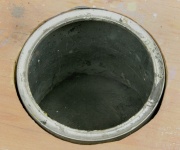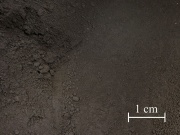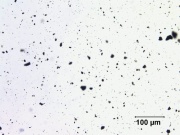Difference between revisions of "Bone black"
(username removed) |
|||
| (6 intermediate revisions by 4 users not shown) | |||
| Line 2: | Line 2: | ||
== Description == | == Description == | ||
| − | An impure black carbon pigment prepared from charring animal bones. Bone black is composed of about 10% [ | + | An impure black carbon pigment prepared from charring animal bones. Bone black is composed of about 10% [[carbon]] and 84% [[calcium hydroxyapatite]] along with smaller amounts of [[magnesium phosphate]] and [[calcium carbonate]] (Gettens and Stout 1966). The stable blue-black pigment is denser than carbon black and has a good working quality for oil paints and watercolors. It is also used in engraving inks and as a decolorizing agent for refining sugars and syrups. A fine particle grade of bone black is sold as [[ivory black]] and an inferior grade has been sold as [[Paris black]]. [[Drop black]] was a commercial product consisting of dried lumps formed after bone black was mixed with [[water]] and [[glue]]. It was commonly used in the 19th century for house paints. |
[[File:Bone.black_det.jpg|thumb|Bone black]] | [[File:Bone.black_det.jpg|thumb|Bone black]] | ||
| + | |||
== Synonyms and Related Terms == | == Synonyms and Related Terms == | ||
Pigment Black 9; CI 77267; Beinschwarz (Deut.); noir d'os (Fr.); negro de huesos (Esp.); nero d'ossa (It.); beenderzwart (Ned.); negro de osso (Port.); animal black; ivory black; drop black; Frankfort black; German black; bone char; bone charcoal; animal charcoal; ossa sepiae | Pigment Black 9; CI 77267; Beinschwarz (Deut.); noir d'os (Fr.); negro de huesos (Esp.); nero d'ossa (It.); beenderzwart (Ned.); negro de osso (Port.); animal black; ivory black; drop black; Frankfort black; German black; bone char; bone charcoal; animal charcoal; ossa sepiae | ||
| − | + | == Risks == | |
| − | == | + | [[File:49_Bone_black_200X.jpg|thumb|Bone black]] |
| + | Flammable as a suspended dust. | ||
| + | == Physical and Chemical Properties == | ||
Particles are coarse, irregularly shaped and vary in color from brown to black | Particles are coarse, irregularly shaped and vary in color from brown to black | ||
| Line 18: | Line 21: | ||
|- | |- | ||
! scope="row"| Density | ! scope="row"| Density | ||
| − | | 2.29 | + | | 2.29 g/ml |
|- | |- | ||
! scope="row"| Refractive Index | ! scope="row"| Refractive Index | ||
| Line 24: | Line 27: | ||
|} | |} | ||
| − | + | == Resources and Citations == | |
| − | == | ||
| − | |||
| − | |||
| − | |||
| − | |||
| − | |||
| − | |||
| − | |||
| − | |||
| − | * | + | * R. J. Gettens, G.L. Stout, ''Painting Materials, A Short Encyclopaedia'', Dover Publications, New York, 1966 Comment: p. 99: density=2.29; ref. index=1.65-1.70 |
| − | * | + | * G.S.Brady, ''Materials Handbook'', McGraw-Hill Book Co., New York, 1971 Comment: p. 108 |
| − | * | + | * Ralph Mayer, ''A Dictionary of Art Terms and Techniques'', Harper and Row Publishers, New York, 1969 (also 1945 printing) |
* ''Dictionary of Building Preservation'', Ward Bucher, ed., John Wiley & Sons, Inc., New York City, 1996 | * ''Dictionary of Building Preservation'', Ward Bucher, ed., John Wiley & Sons, Inc., New York City, 1996 | ||
| Line 45: | Line 39: | ||
* ''The Dictionary of Art'', Grove's Dictionaries Inc., New York, 1996 Comment: "Pigment" | * ''The Dictionary of Art'', Grove's Dictionaries Inc., New York, 1996 Comment: "Pigment" | ||
| − | * | + | * M. Doerner, ''The Materials of the Artist'', Harcourt, Brace & Co., 1934 |
| − | * | + | * Michael McCann, ''Artist Beware'', Watson-Guptill Publications, New York City, 1979 |
| − | * | + | * Monona Rossol, ''The Artist's Complete Health and Safety Guide'', Allworth Press, New York, 1994 |
| − | * | + | * John S. Mills, Raymond White, ''The Organic Chemistry of Museum Objects'', Butterworth Heineman, London, 2nd ed., 1994 |
| − | * | + | * R. Newman, E. Farrell, 'House Paint Pigments', ''Paint in America '', R. Moss ed., Preservation Press, New York City, 1994 |
| − | * | + | * Thomas B. Brill, ''Light Its Interaction with Art and Antiquities'', Plenum Press, New York City, 1980 |
| − | * | + | * Richard S. Lewis, ''Hawley's Condensed Chemical Dictionary'', Van Nostrand Reinhold, New York, 10th ed., 1993 |
* ''The American Heritage Dictionary'' or ''Encarta'', via Microsoft Bookshelf 98, Microsoft Corp., 1998 | * ''The American Heritage Dictionary'' or ''Encarta'', via Microsoft Bookshelf 98, Microsoft Corp., 1998 | ||
Latest revision as of 15:11, 9 May 2022
Description
An impure black carbon pigment prepared from charring animal bones. Bone black is composed of about 10% Carbon and 84% Calcium hydroxyapatite along with smaller amounts of Magnesium phosphate and Calcium carbonate (Gettens and Stout 1966). The stable blue-black pigment is denser than carbon black and has a good working quality for oil paints and watercolors. It is also used in engraving inks and as a decolorizing agent for refining sugars and syrups. A fine particle grade of bone black is sold as Ivory black and an inferior grade has been sold as Paris black. Drop black was a commercial product consisting of dried lumps formed after bone black was mixed with Water and Glue. It was commonly used in the 19th century for house paints.
Synonyms and Related Terms
Pigment Black 9; CI 77267; Beinschwarz (Deut.); noir d'os (Fr.); negro de huesos (Esp.); nero d'ossa (It.); beenderzwart (Ned.); negro de osso (Port.); animal black; ivory black; drop black; Frankfort black; German black; bone char; bone charcoal; animal charcoal; ossa sepiae
Risks
Flammable as a suspended dust.
Physical and Chemical Properties
Particles are coarse, irregularly shaped and vary in color from brown to black
ASTM (1999) lightfastness = I (excellent)
| Density | 2.29 g/ml |
|---|---|
| Refractive Index | 1.65-1.70 |
Resources and Citations
- R. J. Gettens, G.L. Stout, Painting Materials, A Short Encyclopaedia, Dover Publications, New York, 1966 Comment: p. 99: density=2.29; ref. index=1.65-1.70
- G.S.Brady, Materials Handbook, McGraw-Hill Book Co., New York, 1971 Comment: p. 108
- Ralph Mayer, A Dictionary of Art Terms and Techniques, Harper and Row Publishers, New York, 1969 (also 1945 printing)
- Dictionary of Building Preservation, Ward Bucher, ed., John Wiley & Sons, Inc., New York City, 1996
- The Dictionary of Art, Grove's Dictionaries Inc., New York, 1996 Comment: "Pigment"
- M. Doerner, The Materials of the Artist, Harcourt, Brace & Co., 1934
- Michael McCann, Artist Beware, Watson-Guptill Publications, New York City, 1979
- Monona Rossol, The Artist's Complete Health and Safety Guide, Allworth Press, New York, 1994
- John S. Mills, Raymond White, The Organic Chemistry of Museum Objects, Butterworth Heineman, London, 2nd ed., 1994
- R. Newman, E. Farrell, 'House Paint Pigments', Paint in America , R. Moss ed., Preservation Press, New York City, 1994
- Thomas B. Brill, Light Its Interaction with Art and Antiquities, Plenum Press, New York City, 1980
- Richard S. Lewis, Hawley's Condensed Chemical Dictionary, Van Nostrand Reinhold, New York, 10th ed., 1993
- The American Heritage Dictionary or Encarta, via Microsoft Bookshelf 98, Microsoft Corp., 1998
- Art and Architecture Thesaurus Online, http://www.getty.edu/research/tools/vocabulary/aat/, J. Paul Getty Trust, Los Angeles, 2000


